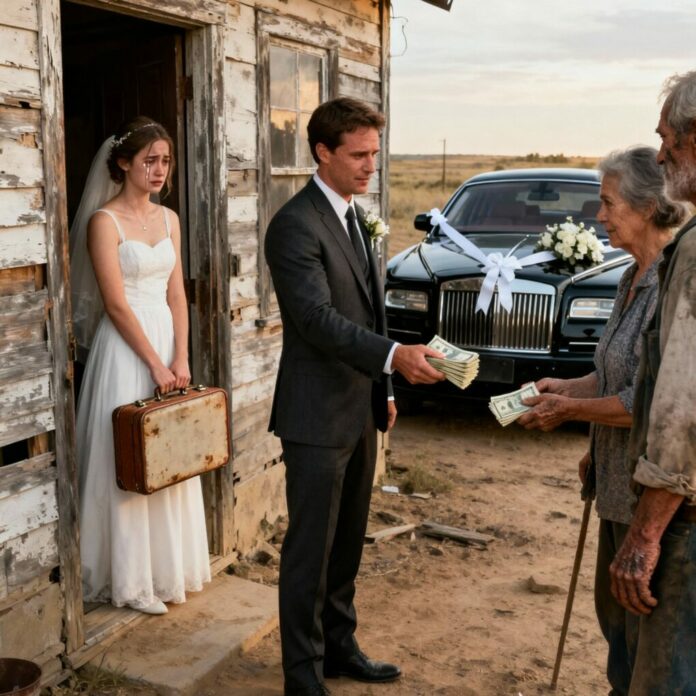
In 1966, in a quiet rural town in Harmony Creek, Tennessee, lived Matilda Hayes, a 20-year-old girl who had never once stepped beyond the expectations of her father. Her father, Walter Hayes, was a strict, prideful farmhand who believed a daughter’s worth was defined by her purity, obedience, and silence. Matilda grew up hidden behind curtains—while other girls her age laughed, met boys, and dreamed, she learned only to sew, cook, and keep her eyes lowered. She had never held a boy’s hand. Never shared a conversation alone with one. Her life was not lived—it was guarded.
But that year, disaster struck. A long drought swept through Tennessee, killing crops and starving livestock. Walter lost his job on the farm, and soon, the family pantry was almost empty. For days, Matilda and her family survived only on watered-down cornmeal. Her younger brothers cried from hunger at night. Her mother cried quietly at dawn.
One evening, Matilda heard low voices from the living room. When she stepped closer, she heard a name: Arthur Shaw. Everyone in town knew him—the quiet man who lived alone on a large farm outside of town. He was 45 years old, wealthy, respected, but strangely solitary. No one had ever seen him court a woman.
When the visitor left, Walter called Matilda to sit before him. His voice shook—not from tenderness, but from humiliation.
“Matilda,” he said, not meeting her eyes, “Arthur Shaw has asked to marry you.”
Matilda froze. “But I don’t know him,” she whispered.
“He is a good man,” her father insisted. “He will provide for you. For all of us.”
Her mother’s red, swollen eyes revealed the truth: this wasn’t a marriage—this was a transaction.
Matilda’s voice trembled. “How much did he offer?”
Walter swallowed. “Two thousand dollars.”
Her breath broke. That was enough to save the family from starvation.
“Daddy,” she whispered, heart cracking, “are you selling me?”
Walter’s silence was the answer.
Nine days later, dressed in a gown Arthur had paid for, Matilda walked down the aisle feeling like she was walking into a grave. Her first kiss was at the altar, before strangers, without love. That night, her hands trembled as she entered his house—the house of a stranger she was now bound to.
And when Arthur closed the bedroom door, he said quietly:
“Matilda… before anything happens tonight, I need to tell you the truth.”
Matilda sat on the edge of the bed, her wedding dress still uncomfortably stiff around her waist. The room was quiet—too quiet—besides the distant ticking of the clock on the dresser. Arthur stood a few feet away, hands clasped in front of him, unable to look her in the eyes.
“I know this marriage was sudden for you,” he began. His voice was soft—gentler than she expected. “But I did not bring you here to hurt you.”
Matilda remained silent. She couldn’t trust her voice.
Arthur inhaled shakily. “There is something about me I must confess before we make any assumptions about what it means to be husband and wife.” He paused, visibly gathering courage. “I was born… different.”
Matilda frowned, unsure of his meaning.
“My body,” he continued, “is not like other men’s. I cannot—” He struggled, his voice cracking. “I cannot be with a wife in the way a husband usually is. I cannot give children. I cannot offer… that part of marriage.”
The words hung in the air like a fragile glass that Matilda was afraid to break.
She stared at him, expecting to feel disgust or anger—but instead, she felt something unexpected: recognition. She knew what it meant to live in a body that wasn’t allowed to choose. She knew shame. Loneliness. Silence.
Arthur stepped back as if already preparing for rejection. “You are free, Matilda,” he whispered. “I will not touch you unless you want me to. You will have your own room if you wish. I only ask… for company. Someone to talk to at supper. Someone to live beside. I simply cannot bear the silence anymore.”
For the first time since her wedding, Matilda looked into Arthur’s eyes—and saw a man who had spent his entire life isolated, not because he was unkind, but because he was afraid of being seen.
That night, they did not share a bed. Arthur slept in the guest room. Matilda lay awake, staring at the ceiling, realizing the world had not given her freedom—but Arthur had given her choice.
In the days that followed, their home remained quiet, but gentle. Matilda explored the farmhouse, and one afternoon, she discovered the library—hundreds of books lining the shelves.
When Arthur found her reading, he simply said, “You may read anything you like. Nothing in this house is off limits to you.”
It was the first time in her life anyone had ever spoken those words.
And for the first time, Matilda felt the faint stirring of something she had never known:
Possibility.
Weeks passed, and life settled into an unexpected rhythm. Matilda learned the pathways of the farm—the creaking porch steps, the warm smell of horses in the barn, the quiet hum of work in the fields. Arthur taught her how to track ledgers, manage stores, and oversee the workers. She absorbed everything with a sharp, eager mind that had simply never been allowed to stretch before.
One evening, as they sat on the porch watching the sunset, Arthur asked gently, “Matilda… are you unhappy here?”
She took her time before answering.
“No,” she said softly. “For the first time… I can breathe.”
Arthur looked at her, eyes filling, but he didn’t speak.
Soon after, Arthur fell ill—feverish and weak. Matilda tended to him day and night, wiping his forehead, feeding him broth, keeping him alive with quiet determination. When he finally opened his eyes after days of fever, he saw her sleeping upright beside his bed.
“You stayed,” he whispered.
“I’m your wife,” she replied.
From that moment, something unspoken shifted between them—not romance, not desire—but trust. Partnership. A bond formed not from expectation, but from care.
Months became years. Their home grew warmer, fuller, more lived-in—but always missing one sound: the laughter of children.
One day, Matilda gently asked, “Arthur… what if we adopt?”
His expression broke into something like hope. “Do you truly want that?”
“Yes,” she said. “A family is not only born—it can be chosen.”
They traveled to an orphanage in Nashville, where a small, frightened seven-year-old girl named Ella clung to the doorway. Matilda knelt and extended her hand.
“We would like to know you,” she said. “And if you’d like us… we’d like to be your family.”
Ella slowly placed her small hand into Matilda’s.
And just like that—they became a family.
Over time, they adopted two more children—Liam and Mia—filling the farmhouse with noise, running feet, shared meals, and love that didn’t need to look like anyone else’s.
Neighbors whispered, judged, gossiped—but their words couldn’t penetrate the quiet happiness in the Shaw home.
Matilda had once been sold.
But in the end, she had gained:
A home.
A partner.
A family.
A life built not from desire—but from choice.
“Love has many shapes,” Matilda would later tell her children. “Ours just looked different—and that’s what made it ours.”
CALL TO SHARE
If this story touched your heart, share it — someone out there needs to be reminded that love doesn’t have to look like everyone else’s to be real. 💛
News
VACC supports driver’s complaints vs Rhian, Michelle, Samantha
(Left photo) Rhian Ramos, Samantha Panlilio, and Michelle Dee are facing accusations of torture and serious illegal detention filed by…
Are Katrina Halili and Kris Lawrence Back Together? Netizens Go Wild Over Viral Video That Rekindles Old Flames
One video. A few smiles. A familiar chemistry.And suddenly, the internet is asking the question everyone thought was long buried…
atrina Halili and Kris Lawrence were “together again” in a sweet moment, causing Katie Halos to shed tears of happiness.
Together Again: Katrina Halili, Kris Lawrence, and a Reunion That Spoke of Healing and Family In the world of entertainment,…
FROM SILENCE TO EXPLOSION: Robin Padilla Lays the Cards on the Table, PBBM Faces Political Turmoil!
From Silence to Open Discourse: Robin Padilla Speaks Out as PBBM Faces a Defining Political Moment In politics, silence can…
THE UNIFORM THAT BEGAN THE AWAKENING
The entire living room was silent when I entered. Not because anyone was impressed— but because no one noticed me…
ANG TAHIMIK NA PANALO: …Ngumiti lang si Lisa.
Hindi siya sumagot agad. Hindi niya tinanggihan. Hindi rin niya ipinagtanggol ang sarili. Basta dahan-dahan lang siyang humigop ng iced…
End of content
No more pages to load












